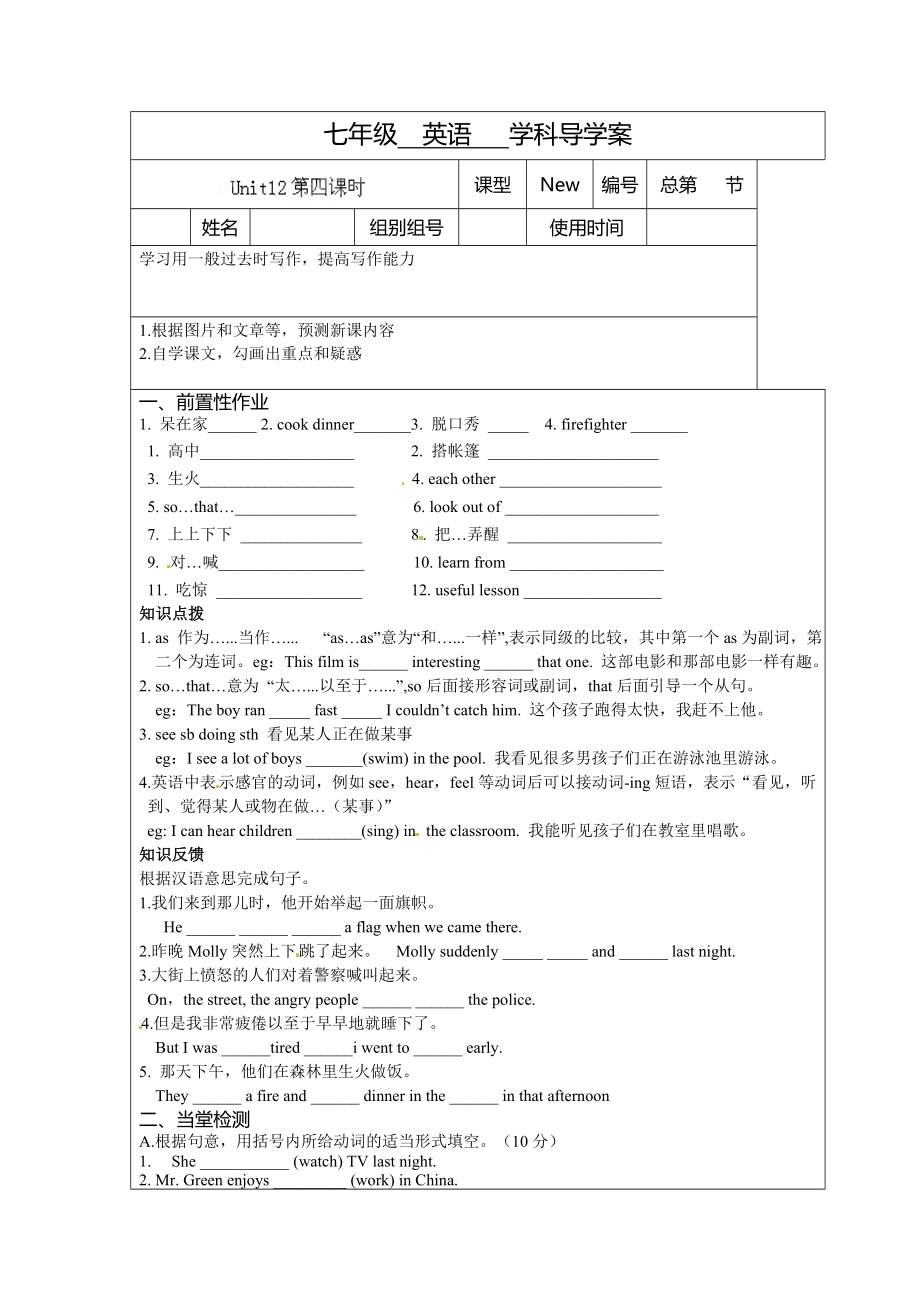《人教新目標(biāo)七年級(jí)下冊(cè)英語 Unit 12 Unit 12 第4課時(shí) 教案》由會(huì)員分享����,可在線閱讀��,更多相關(guān)《人教新目標(biāo)七年級(jí)下冊(cè)英語 Unit 12 Unit 12 第4課時(shí) 教案(2頁珍藏版)》請(qǐng)?jiān)谘b配圖網(wǎng)上搜索�。
1、七年級(jí) 英語 學(xué)科導(dǎo)學(xué)案
課型
New
編號(hào)
總第 節(jié)
姓名
組別組號(hào)
使用時(shí)間
學(xué)習(xí)用一般過去時(shí)寫作�,提高寫作能力
1.根據(jù)圖片和文章等,預(yù)測(cè)新課內(nèi)容
2.自學(xué)課文���,勾畫出重點(diǎn)和疑惑
一��、 前置性作業(yè)
1. 呆在家______ 2. cook dinner_______3. 脫口秀 _____ 4. firefighter _______
1. 高中___________________ 2. 搭帳篷 _____________________
3. 生火___________________ 4. ea
2�、ch other ____________________
5. so…that…_______________ 6. look out of ___________________[來源:學(xué),科,網(wǎng)Z,X,X,K]
7. 上上下下 _______________ 8. 把…弄醒 ___________________
9. 對(duì)…喊__________________ 10. learn from ___________________
11. 吃驚 __________________ 12. useful lesson __
3、_______________
知識(shí)點(diǎn)撥
1. as 作為…...當(dāng)作…... “as…as”意為“和…...一樣”,表示同級(jí)的比較����,其中第一個(gè)as為副詞,第二個(gè)為連詞����。eg:This film is______ interesting ______ that one. 這部電影和那部電影一樣有趣��。
2. so…that…意為 “太…...以至于…...”,so后面接形容詞或副詞�����,that后面引導(dǎo)一個(gè)從句��。
eg:The boy ran _____ fast _____ I couldn’t catch him. 這個(gè)孩子跑得太快�,我趕不上他。
3. see sb doing
4��、 sth 看見某人正在做某事
eg:I see a lot of boys _______(swim) in the pool. 我看見很多男孩子們正在游泳池里游泳�����。
4.英語中表示感官的動(dòng)詞��,例如see,hear���,feel等動(dòng)詞后可以接動(dòng)詞-ing短語�����,表示“看見���,聽到、覺得某人或物在做…(某事)”
eg: I can hear children ________(sing) in the classroom. 我能聽見孩子們?cè)诮淌依锍琛?
知識(shí)反饋
根據(jù)漢語意思完成句子���。
1.我們來到那兒時(shí)�����,他開始舉起一面旗幟�����。
He ______ ______ ______
5�、a flag when we came there.
2.昨晚Molly突然上下跳了起來�����。 Molly suddenly _____ _____ and ______ last night.
3.大街上憤怒的人們對(duì)著警察喊叫起來。
On���,the street, the angry people ______ ______ the police.
4.但是我非常疲倦以至于早早地就睡下了�����。
But I was ______tired ______i went to ______ early.
5. 那天下午��,他們?cè)谏掷锷鹱鲲垺?
They ______ a fire
6���、and ______ dinner in the ______ in that afternoon
二����、 當(dāng)堂檢測(cè)
A.根據(jù)句意,用括號(hào)內(nèi)所給動(dòng)詞的適當(dāng)形式填空��。(10分)
1. She ___________ (watch) TV last night.
2. Mr. Green enjoys _________ (work) in China.
3. He wants _________ (be) an English teacher in the future(將來).
4. They ___________(be) here yesterday.
5. I’d like
7���、you ____________(meet) my parents.
6. Listen! who ____________ (sing) in the room?
7.Tom usually _____________(get) up at six o’clock in the morning.]
8.She likes ___________(draw) pictures.
9. Mrs. Li ___________(live) in China next week.
10.Look! The boys ___________(play) football over the
8�����、re.
B.用所給動(dòng)詞的適當(dāng)形式填空���。
1.We ______ (live) in Japan last year.
2.The boy______________ (visit) his uncle last Friday.
3.Tom ______ (clean) his room and _________(study) for the Chinese test last weekend.
4.What ______ you ______(do) last night?
5.On Sunday morning I _______ (play) tennis.
6.
9�、What ______ (do) your father do last Monday?
7.Tom ______ (study) English last night.
8.They ________ (go) to the park last Saturday afternoon.
9.We ________ ( have) a class meeting last Tuesday afternoon.
10.He_______ (watch) TV over the weekend.
C.句型轉(zhuǎn)換?
1.This is my pencil? (變一般疑問句)??
10��、?_____ _____ your pencil ?
2. These red socks are Kate’s. (變一般疑問句)??? ?????? ??????? ?
_____ _____socks Kate’s?
3. I want to buy a big green bag . (變特殊疑問句)?? ?? ????? ???
_____you want to buy _____ _____ _____?[]
4. Mary does not have any books . (變肯定句)
Mary_____ _____ books .
5. The clothing shop is on sale . (變?yōu)榉穸ň?
_______________________________
6. She likes the black bag very much . (變?yōu)榉穸ň?
____________________ ____
[來源:學(xué)+科+網(wǎng)Z+X+X+K]
 人教新目標(biāo)七年級(jí)下冊(cè)英語 Unit 12 Unit 12 第4課時(shí) 教案
人教新目標(biāo)七年級(jí)下冊(cè)英語 Unit 12 Unit 12 第4課時(shí) 教案

